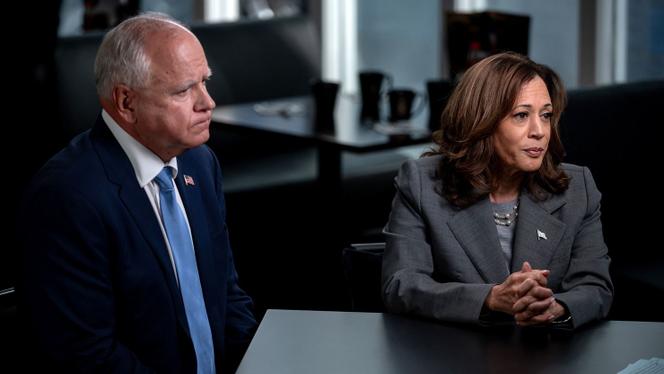
It took 40 days for Kamala Harris to accept a basic exercise in presidential campaigning: the television interview. This astonishing delay, since Joe Biden withdrew in her favor, offered Republicans a window of opportunity against the Democratic candidate. Is it possible to aspire to the highest office if you shun possible confrontations so much? Harris’s appearance on CNN on Thursday, August 29, was eagerly awaited and scrutinized. The 24-hour news channel even had a permanent countdown throughout its programming during the day, as if waiting for a space mission to lift off from Cape Canaveral.
The wait was excessive. Harris didn’t crash nor shine. The interview was short – 27 minutes interrupted by commercial breaks and campaign footage – with no major faults or memorable moments. The setting was strange – a sort of impersonal, gray office – and the framing unfavorable to Harris, who appeared squeezed between her running mate, Tim Walz, and journalist Dana Bash.
The Democratic candidate spoke in a poised manner, occasionally allowing herself a broad smile or a laugh, but lacking in any scathing remarks. No doubt keen to appear as presidential and controlled as possible, she failed to embody the energy that has been driving the Democratic campaign since late July. But the real test was not Thursday on CNN. It will come on September 10, when she faces Donald Trump in their debate on ABC.
Tribute to Biden
Harris called on voters to “turn the page on the last decade,” which has been contrary to “the spirit of our country.” She blamed the former president for “dividing our nation.” The only foreign policy question asked concerned the war in Gaza. Harris did not support a freeze on arms shipments to Israel. She renewed her commitment to the defense of Israel and called for a successful conclusion to the negotiations, including the release of hostages who are still alive and a ceasefire.
The candidate also vigorously defended the Biden administration’s record, pointing out that “the economy had crashed” before they arrived at the White House. Harris briefly outlined her own plans, such as the $25,000 tax credit for first-time homebuyers, “part of the American dream.” The vice president acknowledged that “prices in particular for groceries are still too high,” while insisting on reducing inflation to 3%, creating jobs in industry and renegotiating drug prices with the pharmaceutical industry. Regarding the migration crisis, she laid the blame back on Trump, whom she accused of “killing” the bill negotiated on a bipartisan basis in the Senate, which “would’ve put 1,500 more agents on the border” with Mexico.
You have 64.01% of this article left to read. The rest is for subscribers only.